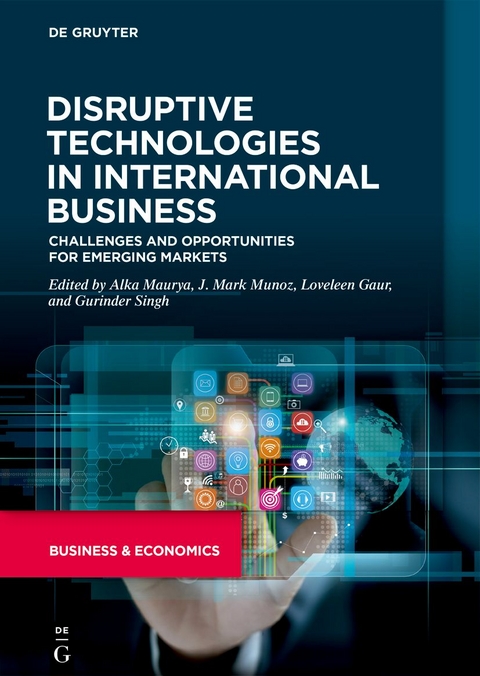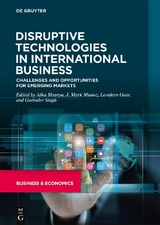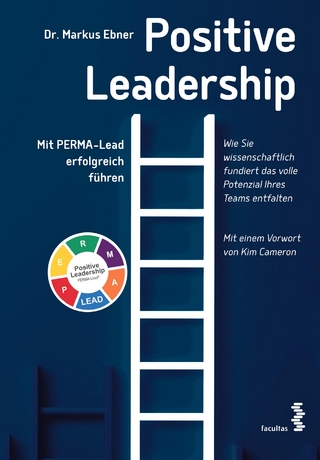Disruptive Technologies in International Business
De Gruyter (Verlag)
978-3-11-073859-9 (ISBN)
lt;p>Dr. Alka Maurya is Associate Professor at Amity International Business School, Amity University, Noida. She completed her Masters in International Business from the Indian Institute of Foreign Trade, New Delhi and Ph.D from Jiwaji University, Gwalior. Her area of specialization is International BusinessShe has over 19 years' experience in teaching, research and consulting. She has worked on several reports for Department of Commerce, Export Promotion Councils, Commodity Boards, MNCs and MNMEs while she was working with Plastics Export Promotion Council (Plexconcil) and NCTI (National Centre for Trade Information), an UN designated Trade Point in India. She has published several books and research papers in her area of specialization.
Dr. J. Mark Munoz is a graduate of MBA and PhD in Management at the University of San Jose. Prior to joining the academe, he held senior management roles in diverse multinational organizations. He was a former Visiting Fellow at the Kennedy School of Government at Harvard University. He currently serves as an Advisor to the AI Initiative at Harvard University. A multi-awarded professor, he received several prestigious awards including a Literary Award, two International Book Awards, four Best Paper Awards, the 2012 Distinguished Scholar by the Academy of Global Business Advancement, the 2013 ACBSP Teaching Excellence Award (one of 10 in the world), the 2014 Teaching Excellence and Leadership Award at Millikin University and the 2019 Amity/IEEE Global Academic Excellence Award. A prolific writer, his work has been published in numerous business and academic journals. He authored/co-authored/edited over twenty (20) books such as : Winning Across Borders, A Salesman in Asia, International Social Entrepreneurship, Contemporary Microenterprise, Handbook on the Geopolitics of Business, Managerial Forensics, Advances in Geoeconomics, Global Business Intelligence, and Business Strategy in the Artificial Intelligence Economy. He is currently a Full Professor of Management and International Business at the Tabor School of Business and the Dwayne Andreas Professor of Business. He teaches Business Creation, International Business, Business Strategy, and International Business Consulting.
Dr. Loveleen Gaur, Professor, Program Director (Artificial Intelligence and Business Intelligence and Data Analytics), Senior IEEE member and Series Editor. She is working with Amity International Business School, Amity University, Noida and is an established author and researcher and has filed three patents in the area of IoT. Professor Gaur has significantly contributed to enhancing scientific understanding by participating in over three hundred scientific conferences, symposia and seminars, by chairing technical sessions and delivering plenary and invited talks. She has specialized in the fields of Information Sciences IoT, Data Analytics, E-commerce and E-Business, Data Mining, and Business Intelligence. Professor Gaur pursued research in truly inter-disciplinary areas and authored and co-authored around 10 books with publishers such as Elsevier, Springer, Taylor and Francis. She is invited as Guest Editor for Springer NASA Journal and Emerald Q1 journal. She has published more than 60 research papers in SCI and Q1 Journals. She has chaired various positions in International Conferences of repute and is a reviewer with IEEE, SCI and ABDC Journals. She is actively involved in various projects of Government of India and abroad. She has been honoured with prestigious National and International awards like "Senior Women Educator & Scholar Award" by National Foundation for Entrepreneurship Development on Women's Day, "Sri Ram Award" by Delhi Management Association (DMA) and "Distinguished Research Award" by Allied Academies presented this award in Jacksonville, Florida and "Outstanding research cont
1) New age technologies and disruption of globalization
Technology is one of the key drivers of globalization. Recent advances such as artificial intelligence, blockchain, cloud computing, big data, and data analytics have revolutionized the international business landscape. This chapter will summarize how such breakthrough technologies have disrupted international business.
Alka Maurya, Amity University, India, and Mark Munoz, Millikin University, USA
2) Smart contracts and international business
Smart contracts are transforming international business operations. Blockchain based smart contracts facilitate international business operations by adding trust and transparency to transactions. This chapter evaluates how smart contracts are now increasingly being used by global companies to connect with their stakeholders and share vital information on a real time basis.
Eve Man Hin CHAN, Technological and Higher Education Institute, Hong Kong
3) Technopoles, factories of the future and innovation districts: The socio-spatial reorganization of international business
In order to meet the challenges of the global economy, many countries have resourced infrastructure development in the form of industrial corridors (for example, in India), and re-territorialization via megaregions (in China). Simultaneously, a significant reorganization of production is taking place by making use of new technologies, particularly AI, in technopoles, factories of the future and innovation districts. Cities and regions are witnessing the relocation to urban areas of advanced manufacturing and high tech corporate activity. Factories of the future in technopoles and innovation districts constitute new megaprojects that significantly alter the urban fabric and the socio-economic structure of entire neighborhoods. In turn, many urban megaprojects concentrate innovative corporate functions and activities. In so far as these new centers of corporate activity are located in cities, megacities, megaregions and urbanized areas, corporate strategies have a direct impact on urban sustainable development. In this context, a new spatial reorganization of production places urban areas at the core and presents formidable challenges for sustainability: they both enable and constrain it in urban areas on an unprecedented scale.
Gerardo del Cerro Santamaría, Member of the European Union Expert Group in Regional Policy (Regio Program) and a United States Fulbright Award Recipient in Urban Planning
4) IoT, smart cities and international business
The focus of many governments across the globe is to transform their cities into smart cities due to the inherent advantages of such a transition in contributing to a greener planet. This chapter will focus on how newly developed smart cities are contributing to the flow of goods and services from one country to another.
Sandhya Sastry, Faculty of Business & Law, University of West of England, Bristol UK
5) 3-D printing and international business
In an era when the whole world is talking about sustainability and different methods of reducing and recycling waste material, 3-D printing has emerged as a choice for many global manufacturers, though its usage is at very nascent stage in some developing countries. 3-D printing helps in eliminating waste material by reusing it in another process (Berman, 2012). Whatever materials are used in 3-D printing have either been converted into a manufactured product or used for recycling. The important functions of 3-D printing technology include improving the standards of production, shortening global value chains, increasing foreign direct investment and boosting international trade in raw materials etc (Petersen, 2019).
In this chapter, the author will discuss the concept of 3-D printing technology and how and where it has been currently utilised. The author will also discuss the importance of 3-D printing in international business keeping in mind sustainability goals. In this era of globalization, 3-D printing technology can bring new changes in overall manufacturing and production process. The writer will also explain the key functions and importance of 3-D printing for modern day entrepreneurs. The future possibilities and limitations of this technology will also be discussed.
Anuj Kumar, Bharati Vidyapeeth Institute of Management & Research, India
6) Blockchain and secure payments in international business
Payments have always been a problem area in international business operations. Even though letter of credit are considered the safest mechanism to realize payments in international trade, multiple cases of fraud still occur. Blockchain is a key technology for adding security to the entire process.
Purvi Pujari, Bharati Vidyapeeth's Institute of Management Studies and Research, Priyeta Priyadarshini, Bharati Vidyapeeth's Institute of Management Studies and Research
7) Blockchain and global value chains
In international business operations manufacturers/suppliers are located in many different countries.. The effective management of global value chains is critical for companies to remain competitive in the international business landscape. This chapter provides information on how blockchain facilitates the effective management of global value chains and provides vital information about all the intermediaries involved in the entire production cycle.
Geetha Subramaniam, Faculty of Business and Management, Universiti Teknologi MARA, Selangor, Malaysia, Nur Zafira Akma Rozlan, Faculty of Business and Management, Universiti Teknologi MARA, Selangor, Malaysia & Shobha Subramaniam, School of Law, Western Sydney University, New South Wales, Australia
8) Blockchain and documentation in international business
Blockchain is widely used in international business for payment processes, supply chain management and logistics. Global companies now rely on blockchain technology in their global business operations to ensure safety and reliability at all stages of business operations. Blockchain technology is used by companies for issuing certificates of origin, and also in other export documentation such as
Bill of Lading etc. Export documents backed by blockchain technology facilitate custom processes thereby controlling illicit trade as well.
Dr. Md. Nur Alam Siddik, Associate Professor, Ex-Head of the Department of Finance and Banking, Director, Office of the Student Affairs, Begum Rokeya University, Bangladesh, Suresh Iyer, Global Management and Academic Consultant, Archie D'Souza, Dayanand Sagar University.
9) New divisions of labour under Industry 4.0
Industry 4.0 refers to the new forms of production that rely increasingly on automation and the introduction of sophisticated cyber-physical systems. These production systems are re-revolutionizing existing divisions of labour, which have already been revolutionized by the spread of globalization. Changes come both in terms of what work humans will be still required to do and of social and gender relations within the workplace. New competencies and skills are required in skilled positions, with physicality and actual location becoming less important, although both will remain significant in the many low-skilled and low-paid jobs that will persist. It is already possible to discern changes in divisions of labour in some places of production, with factory automation having restricted human input to marketing, design and control, in addition to maintenance and servicing. It is also evident in the general movement in both the private and public sectors towards the modularization of work, which has seen more and more work functions outsourced and the provision of services coming from the precarious gig economy. These changes have wider impacts in society and may be seen in family structure, urban design and housing policy. Most governments are currently under-prepared for the changes that are already taking place and require better and more informed policy suggestions. As the current division of labour has led to different countries becoming specialized in different stages of production, inequality among societies is likely to be intensified as similar work functions are affected in close order in different parts of the world. This chapter provides an overview of these changes and the effects they will have on people in all categories. It aims to go beyond the factory to examine the changes that will affect people as members of families, communities and societies. In looking forward to inevitable future change, it interrogates the possibilities that policies such as universal basic income will offer fairer ways of ensuring personal security and social solidarity.
John Walsh, RMIT Vietnam
10) E-Business and international trade
This chapter focuses on how e-business has helped in integrating small and medium-sized organizations in the international trade process. Small and medium-sized enterprises previously faced enormous barriers to venturing into the international market as they were not capable of handling huge orders. Companies like Amazon, Alibaba and others have facilitated e-business for a large number and SMEs to sell their products to consumers globally. Millions of SMEs in China could grow their businesses manifold by offering their products on the online portal of Alibaba. Similarly, Amazon has also supported SMEs with its innovative services like fulfilment by Amazon, wherein with minimum efforts, small companies are able to sell their products in the global marketplace
T Mongke, Lecturer, Department of Marketing, University of Botswana, Faculty of Business, Botswana
11) Digital marketing and globalization
Reaching out to customers spread across the globe is a major challenge for global companies. The challenge is not only due to large distances but also because of the difference in their needs, language and culture. Digital marketing is one useful tool used to effectively deal with these challenges.
Digital marketing strategies have now made it far easier for companies to reach every corner of the global marketplace. Almost all companies, from MNCs to the MSMEs are now using various digital marketing platforms like Facebook, LinkedIn, Youtube, Instagram etc. to reach their customers and to understand their needs.T hese platforms not only help in reaching out to the customers in far flung areas but also help in communicating with them in their local languages.
Valtteri Kaartemo, University of Turku, Finland, Department of Marketing and International Business
12) Business strategies of low-tech companies in Sri Lanka in the era of digital disruption
Rapid technological advancements, ubiquitous connectivity, more powerful and ever-cheaper computing power, and changes in the behaviour of digitally connected customers are driving unprecedented disruption and transformation in virtually every industry today. Such radical disruption and transformation and its wider systemic effects, frequently referred to as digital disruption, is attracting substantial attention among both scholars and practitioners alike. Digital disruption can occur at various levels, disrupting life, work and business practices, industry structures, and societal systems. It can pose a threat or provide an opportunity for firms by invalidating existing business models and result in business model innovations. The theory of disruptive innovation evolved and is predominantly focused on high-tech industries in developed economies. However, it is not well understood how a low-tech industry in a developing economy can cope with and shape disruption, and innovate and adapt as digital disruption unfolds. Drawing upon data from four case studies from a low-tech industry in Sri Lanka, this chapter provides preliminary, yet promising empirical evidence that sheds light on the further extension of the theory of disruptive innovation to low-tech industries in developing economies. Highlights of the findings include the following: build and execute a compelling vision, demonstrate top-level management's commitment, digital congruence is the crux, adopt a partner-centric business model, accelerate the speed of innovation and turn people into the business's secret weapon:
Thilini Chathurika Gamage & WKAC Gnanapala, Sabaragamuwa University of Sri Lanka, Sri Lanka
"Say the words disruptive technologies and what comes to mind are Silicon Valley, DC, New York, and London. But far away from the tech zones of the developed countries, a revolution is brewing in developing countries. From Haiti to India, innovative and disruptive technologies are changing the face of international business. Maurya, Munoz, Gaur and Singh, along with a powerful group of experts, have tackled the important issue of cross pollination of knowledge and innovation - but this time with an eye on the emergence of disruptive technologies from the Global South. A timely and powerful book."
--Dr. Al Naqvi, CEO, American Institute of Artificial Intelligence
"Disruptive Technologies in International Business is a great introduction to the underlying technologies that are changing international business and, as a result, our daily lives as well. The authors and contributors cover a plethora of use cases, from marketing and smart cities to daily surface mobility, where many of us have already felt the impact of disruption in our daily lives. The book is insightful, with contributions from an impressive array of subject matter experts. I would highly recommend it for students, practitioners and anyone else who seeks insight and understanding of technology implications to their strategic business plans."
--Mike Srdanovic, Emerging Technology and Data Science Practice Lead - Northern Trust
"This edited book titled Disruptive Technologies in International Business is an excellent anthology and a potpourri of various chapters that address many significant aspects of Disruptive Technologies (DT) in various parts of the world, such as India, Japan and some island economies. These DTs, i.e. Cloud, 5G, additive manufacturing, AI, IoT and Blockchain, are changing the way international business is being conducted and this book is enlightening us in the most efficient and effective scientific and empirical manner with excellent examples from all over the world."
--Marios I. Katsioloudes, PhD, Professor of Strategy and Entrepreneurship and Dean, Faculty of Business Administration and Economics, American University of Cyprus and Special Scientist with the University of Cyprus
| Erscheinungsdatum | 10.05.2022 |
|---|---|
| Zusatzinfo | 1 b/w and 17 col. ill., 5 b/w tbl. |
| Verlagsort | Berlin/Boston |
| Sprache | englisch |
| Maße | 170 x 240 mm |
| Gewicht | 342 g |
| Themenwelt | Wirtschaft ► Betriebswirtschaft / Management ► Unternehmensführung / Management |
| Schlagworte | breakthrough technologies • Disruptive Technologies • E-Business • Emerging Markets • globale Wertschöpfungskette • Global Value Chains • Internationale Geschäfte • Künstliche Intelligenz • Schwellenmarkt • Technologie |
| ISBN-10 | 3-11-073859-7 / 3110738597 |
| ISBN-13 | 978-3-11-073859-9 / 9783110738599 |
| Zustand | Neuware |
| Informationen gemäß Produktsicherheitsverordnung (GPSR) | |
| Haben Sie eine Frage zum Produkt? |
aus dem Bereich




